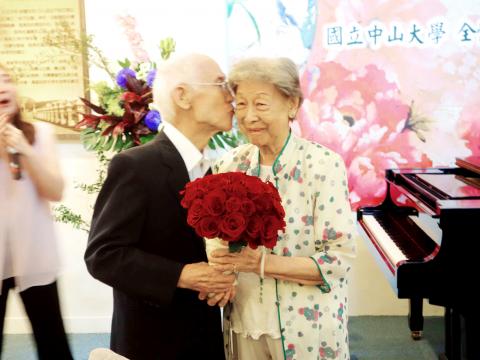Noted poet and essayist Yu Kwang-chung (余光中) yesterday died from complications from pneumonia at age 90, Kaohsiung Medical University Chung-ho Memorial Hospital said.
Yu was hospitalized last week after a suspected mini-stroke, before being transferred to the intensive care unit because of pneumonia, the hospital said, adding that detailed information has been withheld out of respect for Yu’s family.
Yu had been in poor health since last year, when he was twice hospitalized, first for an intestinal complaint and then a fall.

Photo courtesy of National Sun Yat-sen University
He celebrated his 60th wedding anniversary last year by donating to charity.
National Sun Yat-sen University, where Yu was a professor emeritus of literature, said the poet made his last public appearance at his birthday party in October.
One of the last classes Yu taught before he retired from active teaching was a humanities seminar, the university said.
Director Ang Lee (李安) and Chinese writer Wang Anyi (王安憶) gave talks at the seminar and Yu was well enough to give lectures, the university said.
Born in Nanjing, China, in 1928, Yu began writing in 1949 while attending Xiamen University.
Fleeing the Chinese Civil War, he migrated to Taiwan in 1950. He gained renown for his literary talent and proficiency after publishing a half-dozen well-received poems, seven critical essays and two translations in a 10-day period in May that year.
Yu wrote poetry, songs, literary critiques and translations. Several of his works, such as Homesickness (鄉愁), My Four Hypothetical Enemies (我的四個假想敵) and Listen to the Cold Rain (聽聽那冷雨), are taught as standard Chinese literature in Taiwan and China.
Yu won a National Culture and Arts Award for new poetry in 1989, and in 2014, the Ministry of Culture awarded him the Cultural Award.
“We must aspire to gather Chinese words into a great philharmonic through the verisimilitude of syntax. The author’s pen should, as the symphony conductor’s baton, blend the hundreds of notes into music,” Yu said in his Cultural Award acceptance speech.
“Yu writes poems with his right and prose with his left. His achievements are peerless,” essayist and Shakespeare translator Liang Shih-chiu (梁實秋) once said of Yu.
Politically, Yu was regarded as a staunch proponent of Chinese nationalism and had on multiple occasions spoken out against of Taiwanese independence.

Intelligence agents have recorded 510,000 instances of “controversial information” being spread online by the Chinese Communist Party (CCP) so far this year, the National Security Bureau (NSB) said in a report yesterday, as it warned of artificial intelligence (AI) being employed to generate destabilizing misinformation. The bureau submitted a written report to the Legislative Yuan in preparation for National Security Bureau Director-General Tsai Ming-yen’s (蔡明彥) appearance before the Foreign Affairs and National Defense Committee today. The CCP has been using cognitive warfare to divide Taiwanese society by commenting on controversial issues such as Taiwan Semiconductor Manufacturing Co’s (TSMC, 台積電) investments in the

INVESTIGATION: The case is the latest instance of a DPP figure being implicated in an espionage network accused of allegedly leaking information to Chinese intelligence Democratic Progressive Party (DPP) member Ho Jen-chieh (何仁傑) was detained and held incommunicado yesterday on suspicion of spying for China during his tenure as assistant to then-minister of foreign affairs Joseph Wu (吳釗燮). The Taipei District Prosecutors’ Office said Ho was implicated during its investigation into alleged spying activities by former Presidential Office consultant Wu Shang-yu (吳尚雨). Prosecutors said there is reason to believe Ho breached the National Security Act (國家安全法) by leaking classified Ministry of Foreign Affairs information to Chinese intelligence. Following interrogation, prosecutors petitioned the Taipei District Court to detain Ho, citing concerns over potential collusion or tampering of evidence. The

‘COMPREHENSIVE PLAN’: Lin Chia-lung said that the government was ready to talk about a variety of issues, including investment in and purchases from the US The National Stabilization Fund (NSF) yesterday announced that it would step in to staunch stock market losses for the ninth time in the nation’s history. An NSF board meeting, originally scheduled for Monday next week, was moved to yesterday after stocks plummeted in the wake of US President Donald Trump’s announcement of 32 percent tariffs on Taiwan on Wednesday last week. Board members voted to support the stock market with the NT$500 billion (US$15.15 billion) fund, with injections of funds to begin as soon as today. The NSF in 2000 injected NT$120 billion to stabilize stocks, the most ever. The lowest amount it

NEGOTIATIONS: Taiwan has good relations with Washington and the outlook for the negotiations looks promising, Minister of Economic Affairs J.W. Kuo said Taiwan’s GDP growth this year is expected to decrease by 0.43 to 1.61 percentage points due to the effects of US tariffs, National Development Council (NDC) Minister Paul Liu (劉鏡清) said at a meeting of the legislature’s Economics Committee in Taipei yesterday, citing a preliminary estimate by a private research institution. Taiwan’s economy would be significantly affected by the 32 percent “reciprocal” tariffs slapped by the US, which took effect yesterday, Liu said, adding that GDP growth could fall below 3 percent and potentially even dip below 2 percent to 1.53 percent this year. The council has commissioned another institution